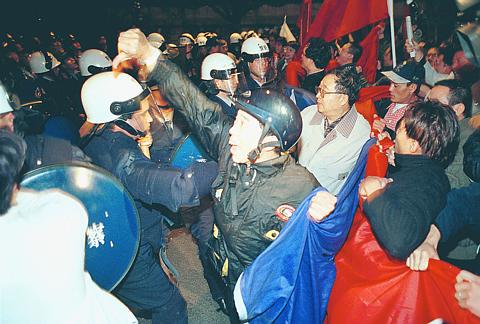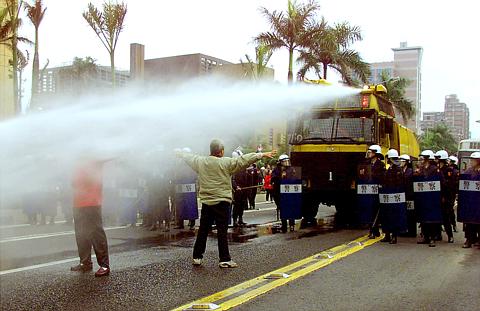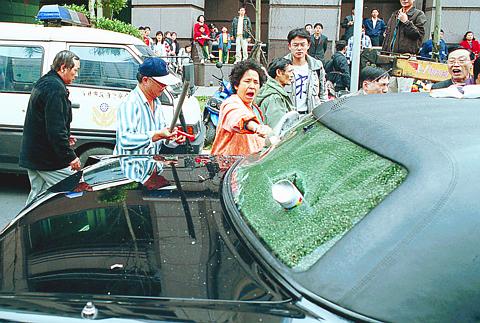Just one day after its defeat in the presidential election, the KMT found itself under siege yesterday as protesters, angry at the loss, lashed out at officials in Taipei.
KMT party chairman Lee Teng-hui (
Riot police resorted to batons and water cannon several times throughout the day in an effort to subdue and disperse the angry crowd in front of KMT headquarters demanding Lee's immediate resignation and blaming him personally for the KMT's defeat.

PHOTO: GEORGE TSORNG, TAIPEI TIMES
At press time, the streets around KMT headquarters were still occupied with thousands of demonstrators.
During a hastily called Central Standing Committee (CSC) meeting yesterday to conduct soul-searching over the party's election loss, Lee said that between now and an extraordinary session of the KMT's National Party Congress in September where the new leadership will be chosen, the party should concentrate on party reform. He advocated the immediate establishment of an ad hoc reform committee.
Outside, meanwhile, angry crowds vented their frustration by calling for Lee's immediate resignation, smashing car windows and even beating Hsu Li-teh (

PHOTO: REUTERS
"Lee step down! Lee step down!" the crowd chanted.
The protest continued into the night, with even Taipei Mayor Ma Ying-jeou (
Ma announced his resignation from his party position at the party's headquarters yesterday,along with other members of the party's leadership, including vice chairman Lien Chan (

PHOTO: GEORGE TSORNG, TAIPEI TIMES
"The chairman, secretary-general, deputy secretary-generals and department directors should all resign to take responsibility [for the failure]," Lee said.
"However, the most urgent thing for the time being is to unite our party members and to launch a complete reform," he said, calling on the party leadership to remain in place to lead the reform process.
A new leadership should be selected at September's party congress, at which time Lee would lead the collective resignation of the incumbent leadership, he said.
After the CSC meeting, KMT spokesman Huang Hwei-chen (
Asked whether Lee really intended to resign as chairman, Huang said it was obvious from Lee's remarks that he has decided to quit and would not seek renewal of his term.
Huang said that, according to the party's constitution, any change in the organization should be passed by the party's National Congress.
As to another demand of the crowd of protesters yesterday, that the party chairman post be directly elected by all party members, Huang said that according to the party's current regulations, the chairman is elected by the party's plenum, and a procedural change as major as this could only be made by the party's national congress.
Many CSC members, including Lien, were either deterred or prevented from attending yesterday's meeting by the protesters besieging the headquarters building.
One analyst said Lee's announcement was a good move both for himself and the party.
"It is better to take the initiative and set a date on leaving the post than be forced to do so," said Lin Chia-lung (
"It is a rational and convincing step," Lin said.
As to why Lee wanted to wait to step down, Lin said: "He is buying time to carry out reforms such as cleaning up party assets or restructuring the party."
Lin regarded the call for democratic reform by direct election of party chairman an issue less urgent than purging the party of gangsters and corrupt elements.
Also, he said, Lee still has an important role to play in smoothing the transition of power from the KMT to the DPP.
Who will succeed Lee is another big problem, Lin said.
"If the KMT cannot reach a consensus on its next leader, it can easily split again. And without the party assets, the KMT machine will no longer matter," he said. "Those who are not happy with the party will not find it difficult to depart."
As he announced his resignation from the CSC yesterday, Ma Ying-jeou cited a need for sweeping reforms to the party following its election defeat.
Ma said that high-ranking members are growing increasingly estranged from the rank and file.
"The KMT has 2 million members, and got about 2 million votes. Where are our members?" Ma said.
Ma encouraged other CSC members to quit so party members could elect their replacements.
He also agreed with the protesters that the party's grassroots members should directly elect the chairman.
Ma denied that his calls for reform came in response to yesterday's announcement that KMT maverick James Soong (
"No matter how many parties there are, the KMT should do everything within its power to democratize its procedures," Ma said.
Before the election, the KMT expelled dozens of its members who supported Soong's campaign, and may now lose more of its rank and file to his new party.
Meanwhile, worried about a stock market dive as a result of uncertainties created by Chen Shui-bian's election and the turmoil involving the KMT, Minister of Finance Paul Chiu (邱正雄) announced yesterday that the Taiwan Stock Exchange's daily downward limit would be halved to 3.5 percent for a two-week period.

A car bomb killed a senior Russian general in southern Moscow yesterday morning, the latest high-profile army figure to be blown up in a blast that came just hours after Russian and Ukrainian delegates held separate talks in Miami on a plan to end the war. Kyiv has not commented on the incident, but Russian investigators said they were probing whether the blast was “linked” to “Ukrainian special forces.” The attack was similar to other assassinations of generals and pro-war figures that have either been claimed, or are widely believed to have been orchestrated, by Ukraine. Russian Lieutenant General Fanil Sarvarov, 56, head

SAFETY FIRST: Double the number of police were deployed at the Taipei Marathon, while other cities released plans to bolster public event safety Authorities across Taiwan have stepped up security measures ahead of Christmas and New Year events, following a knife and smoke bomb attack in Taipei on Friday that left four people dead and 11 injured. In a bid to prevent potential copycat incidents, police deployments have been expanded for large gatherings, transport hubs, and other crowded public spaces, according to official statements from police and city authorities. Taipei Mayor Chiang Wan-an (蔣萬安) said the city has “comprehensively raised security readiness” in crowded areas, increased police deployments with armed officers, and intensified patrols during weekends and nighttime hours. For large-scale events, security checkpoints and explosives

‘POLITICAL GAME’: DPP lawmakers said the motion would not meet the legislative threshold needed, and accused the KMT and the TPP of trivializing the Constitution The Legislative Yuan yesterday approved a motion to initiate impeachment proceedings against President William Lai (賴清德), saying he had undermined Taiwan’s constitutional order and democracy. The motion was approved 61-50 by lawmakers from the main opposition Chinese Nationalist Party (KMT) and the smaller Taiwan People’s Party (TPP), who together hold a legislative majority. Under the motion, a roll call vote for impeachment would be held on May 19 next year, after various hearings are held and Lai is given the chance to defend himself. The move came after Lai on Monday last week did not promulgate an amendment passed by the legislature that

A magnitude 7.0 earthquake struck off Yilan at 11:05pm yesterday, the Central Weather Administration (CWA) said. The epicenter was located at sea, about 32.3km east of Yilan County Hall, at a depth of 72.8km, CWA data showed There were no immediate reports of damage. The intensity of the quake, which gauges the actual effect of a seismic event, measured 4 in Yilan County area on Taiwan’s seven-tier intensity scale, the data showed. It measured 4 in other parts of eastern, northern and central Taiwan as well as Tainan, and 3 in Kaohsiung and Pingtung County, and 2 in Lienchiang and Penghu counties and 1